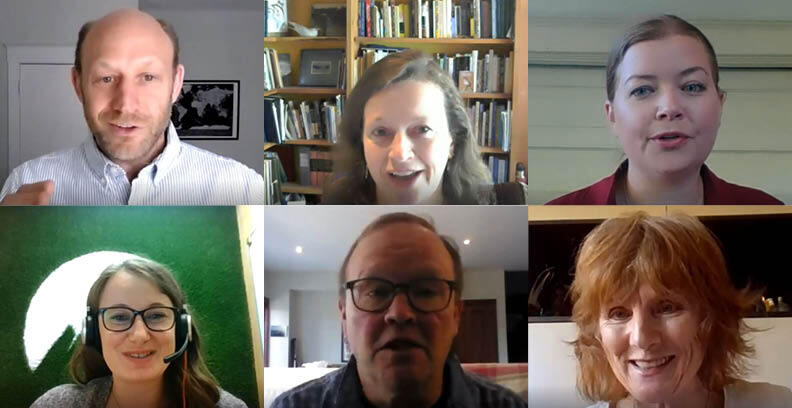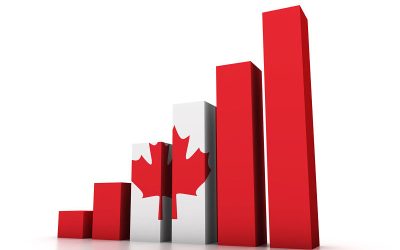Alacrity Cleantech hosted a virtual panel discussion on July 17th on the topic of the plastics circular economy in BC. After working to administer the CleanBC Plastics Action Fund with the Government of BC and circular economy subject matter experts, Synergy Foundation, we wanted to learn more about the state of plastics recycling in the province and what action is being taken to establish a plastics circular economy at the community, industry, and government policy levels. Attendees were a mix of plastics recycling industry players, provincial and federal government representatives, and specialists in plastics recycling policy and action.
Our Circular Economy Panelists
Our panel of experts in the field included:
- Jill Doucette from Synergy Enterprises
- George Roter from the Canada Plastics Pact
- Sue Maxwell from Zero Waste B.C.
- Avery Gottfried from the Ministry of Environment and Climate Change Strategy
- Craig DeLong from KOEL Society
- Louise Schwarz from Recycling Alternative
The panelists discussed a wide variety of topics over the course of the 60-minute event, beginning with the subject of key takeaways from two recent circular economy conferences, the Industrial Circular Economy 2021 Conference organized by Metal Tech Alley and the Recycling Council of British Columbia’s circular economy-focused virtual conference. The discussion then progressed to addressing how we can reconcile the role that the individual consumer plays in reducing plastics consumption with the roles of industry and government players. The panelists also discussed the significance of the federal government’s recent designation of plastic as a toxic substance and the impact and efficacy of current government funds and programs that are designed to support the burgeoning plastics recycling sector in Canada. The event concluded with insights on how the plastics recycling industry can be localized to a greater extent in order to support smaller companies who are collecting and processing plastics waste.
Key Takeaways
Some key points made during the panel discussion include:
- While the transition towards a zero-waste economy is immensely complex, there is considerable interest in developing Canada’s circular economy which is some cause for cautious optimism about the positive change that lies ahead. -George Roter
- While technological innovation in recycling is important, there is still insufficient attention being paid to reducing the amount of plastic products that we consume in the first place. -Sue Maxwell
- The current biggest challenge is the disconnect between industry and policy. -Jill Doucette
- Water bottles and canvas bags are no longer enough. And recycling is not the solution. Responsibility needs to be placed on producers through extended producer responsibility (EPR) which can, if well designed, help incentivize producers to use less plastic-intensive means of production. We also have to ensure that we have good solutions for how products are dealt with at the end of life. We need local markets to sell into, which means manufacturers need to be incentivized to use recycled content. -Louise Schwarz
- The localization of recycling infrastructure is something that needs support, both because it can be complex to establish and also because it is an integral pillar of a successful future circular economy in Canada. -Jill Doucette
- Educating the public about actual emissions is also crucial. Plastics get shipped from Trail to Vancouver to the U.S. or China and turned into recycled material there and then shipped back to Rossland. Just like electric vehicles are not zero-emissions, goods made from recycled plastic are not zero-emissions. -Craig De Long
- We need to look more critically at the things our governments subsidize and the types of requirements we place on manufacturers. Governments can make strides in terms of extending the life of household appliances, for example, if they create minimum warranty requirements. -Sue Maxwell
- There are economic and social concerns that need to be a part of the plastics waste conversation, in addition to environmental concerns. The reality is that cheaper and more accessible goods, which often involve a lot of plastic packaging, do benefit, at least locally, many in society who are socially or economically disadvantaged. -George Roter
- Harmonization of policy is really important; we need to be asking where we need local and provincial differences so that we advance the leading edge in the industry. When people say recycling or compost, there’s not even an agreed upon definition of what those terms mean. That’s a small example, but it is demonstrative nonetheless of the low-hanging fruit that we could look at in terms of national harmonization of the structure around the recycling economy. -George Roter
- The reality is that supply chains are international. That is how they’ve been designed and that is how they run most cost-efficiently, so how do we reconcile this tension between what happens globally and nationally and what happens locally. Things like research and large-scale technical innovation happens at a macro scale, but the implementation and adoption of that knowledge and those technologies needs to happen at a micro scale. -Louise Schwarz
- People typically think about just one or two of the Rs of a circular economy, but there are actually more like nine Rs. Rethink, refuse, reduce, reuse, regift, repair, rent, recycle, and rot. -Craig DeLong
- We looked to tackle carpet recycling and wow – what a rabbit hole that is! There are so many new materials coming out all the time and many are destined for landfills because there’s a lack of any sort of clear recycling option. -Jill Doucette
- In order to develop strong policy we need to start with looking at data, like the information in the Deloitte report which shows where plastics are used, for example, so that we can look at those plastics and say which can be replaced, which can be phased out, which can be used in such a way that they are able to last longer, which can actually be recycled using currently existing systems. -Sue Maxwell
- We must empower small businesses. They are the backbone of any strong economy and we need them to help fill existing gaps in our circular economy. The best-made policy can flounder without the right actors actually benefiting from it. We need to put our efforts into innovation, the repair economy, redesigning products, helping existing businesses shift to new ways of doing business, as well as supporting the localized startup economy. Fortunately, the entrepreneurial spirit already exists at the ready. -Jill Doucette
- Thinking from the coordination lens will be really integral to making broad progress to ensure that we’re moving together forward and not just in small, isolated pockets. -George Roter
- It’s clear that the centralized systems we currently have aren’t working. Local innovators can’t even get in on the action; it’s only possible through a locally-focused distributed model. Additionally, the economic recovery post COVID-19 needs to be green, just, and equitable, so that couples well with localizing. And really, what hyper local boils down to is YIMBY – Yes in my backyard! -Louise Schwarz
Thanks to The panelists and attendees!
A big thanks to all of our panelists, our partners in government and industry, and all of the attendees that participated in this event. We were delighted to see such a positive turnout and, despite being some 16-months into a global pandemic that has led to a rapid increase in “screen fatigue,” everyone in attendance contributed with high energy and thoughtful inputs which led to a lively and informative discussion.

Thank you to our panelists and attendees for joining this session!
If you didn’t get a chance to join the event, but would like to see the recording, email us at [email protected] and we’ll share the video link with you!


